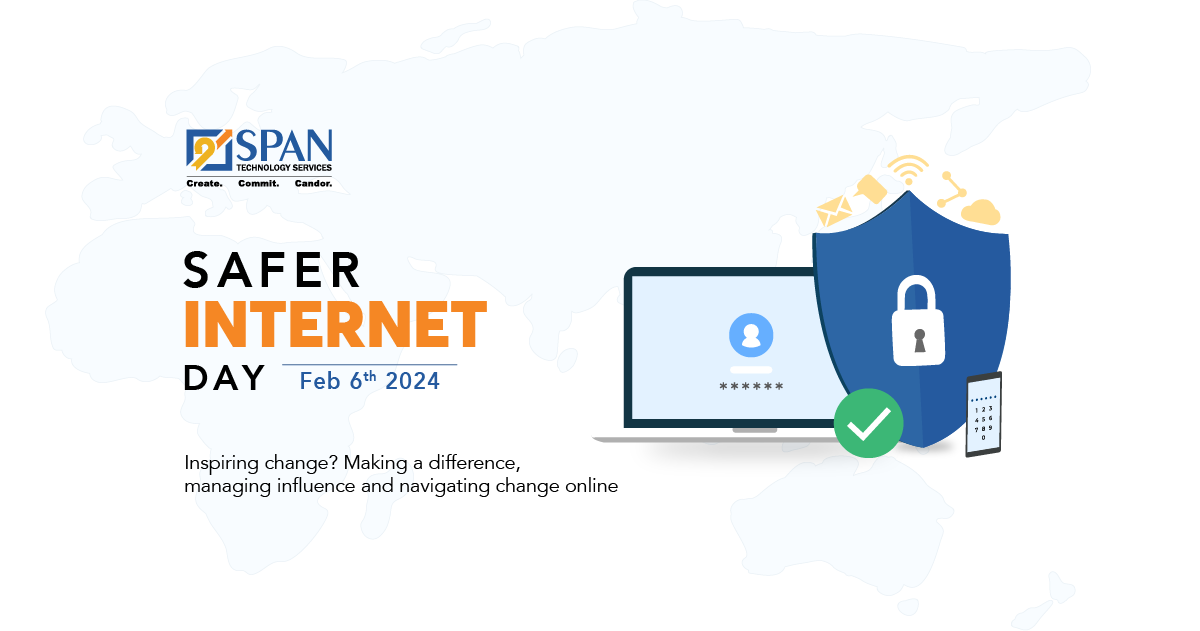
Your Guide to a Safer Internet Experience
The theme for Safer Internet Day: 6th Feb 2024
‘Inspiring change? Making a difference, managing influence and navigating change online’.
Even today, as tools and systems become more powerful, effective cybersecurity relies more on users’ actions in daily routine than it does on technology.Safer Internet Day 2024 is an excellent opportunity to reflect on how we can all create awareness for the responsible and safe aspects of digital technologies. In support of a safer internet for all – in 2024 and for years after – here are some best practices from experts to stay safe.Awareness is the shield that guards against phishing expeditions and manipulative tactics. Stay vigilant, question the unusual, and empower others with the knowledge to recognize and repel digital intruders.From thwarting sophisticated attacks to averting simple yet effective scams, Here are key points on how to use the internet safely:
1. Think Before You Click:
- Avoid clicking on suspicious links, especially in emails or messages.
- Hover over links to preview the URL before clicking.
2. Verify Website Security:
- Look for “https://” in the URL for secure connections.
- Be cautious on websites without a secure connection, especially for sensitive transactions.
3. Use Reputable Websites:
- Stick to well-known and reputable websites for online shopping, banking, and information.
- Read reviews and check ratings before using unfamiliar websites.
4. Educate Yourself on Privacy Settings:
- Understand and adjust privacy settings on social media platforms and online accounts.
- Limit the amount of personal information visible to the public.
5. Practice Safe Online Shopping:
- Use secure and trusted payment methods.
- Check for secure payment gateways and look for the padlock symbol in the address bar.
6. Avoid Public Computers for Sensitive Tasks:
- Refrain from accessing sensitive accounts or conducting financial transactions on public computers.
- If necessary, use private browsing mode and log out after use.
7. Protect Personal Information:
- Be cautious about sharing personal information online.
- Avoid posting sensitive details like addresses, phone numbers, or financial information publicly.
8. Use Strong, Unique Passwords:
- Create strong passwords for each online account.
- Avoid the usage of the same password across multiple platforms.
9. Regularly Update Devices and Software:
- Keep your operating system, antivirus software, and applications up to date.
- Updates which include security patches that protect against vulnerabilities.
10. Enable Device Locks:
- Set up passwords, PINs, or biometric authentication on your devices.
- Activate remote tracking and wiping features for smartphones and tablets.
11. Educate Children about Online Safety:
- Teach children about responsible internet use and potential dangers.
- Use parental controls to monitor kid’s online activities.
12. Be Aware of Public Wi-Fi:
- Avoid the access of sensitive information or making financial transactions on public Wi-Fi.
- when using public networks for added security, use a virtual private network- VPN
13. Review App Permissions:
- Check and review the permissions requested by mobile apps.
- Only grant necessary permissions to necessary people to protect your privacy.
14. Regularly Check Bank Statements:
- Monitor your financial statements for unauthorized transactions.
- In case of any suspicious activity, report immediately to your financial institution.
15. Stay Informed About Cyber Threats:
- We need to Stay updated on the latest cybersecurity threats and trends.
- Be aware of common online scams and phishing techniques.
By incorporating these safe internet practices into your online habits, you’ll create a more secure and enjoyable digital experience.
As we navigate the vast expanse of the digital world, let us be architects of our own safety. Implement these tips, Witness the evolving nature of cybersecurity, and foster a collective commitment to digital vigilance. Be safe and secure, and together, let’s shape cyberspace that empowers rather than endangers.


